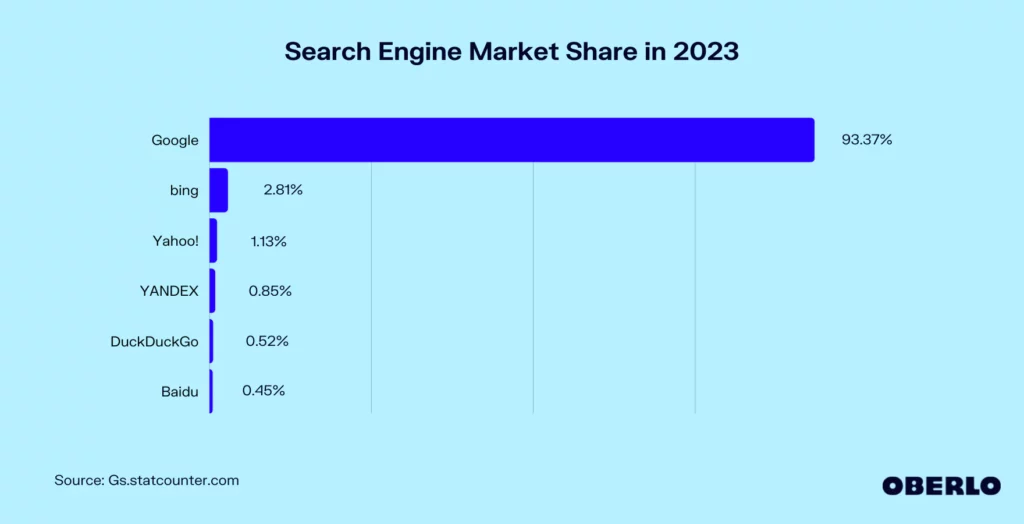Introduction
In today’s digital age, search engine optimization (SEO) and now AI SEO is more important than ever before. If you want your website to be seen by potential customers, you need to make sure it ranks high in search engine results pages (SERPs). Especially on Google since most consumers and potential customers as well as users start there. Google has over 90% of the search market share so even though Microsoft invested in ChatGPT to implement it into Bing as fast as it can they have less than 3% market share and hardly anyone uses Bing compared to Google Search.
As of March 2023, Google has a market share of 93% in the global search engine market. This means that Google is the most popular search engine in the world, and it is used by more people than any other search engine.
Here is a table of the top 5 search engines in the world, as of March 2023:

Google’s dominance in the search engine market is due to a number of factors, including its high quality search results, its user-friendly interface, and its extensive advertising network. Google is constantly innovating and improving its search engine, and it is likely to remain the most popular search engine in the world for many years to come.
There are a number of factors that Google considers when ranking websites, including the quality of the content, the keywords used, and the backlinks to the website. However, one of the most important factors is the use of artificial intelligence (AI).
AI SEO, or artificial intelligence SEO, is a new approach to SEO that uses AI to improve the ranking of websites in SERPs. AI SEO tools use machine learning and natural language processing to analyze websites and identify areas where they can be improved for SEO. This can include things like optimizing the website’s content, structure, and code for search engines.
Google uses a variety of AI ranking algorithms to determine the order in which websites appear in search results. Some of the most important AI ranking algorithms include:
- RankBrain: RankBrain is a machine learning algorithm that helps Google understand the meaning of search queries. RankBrain uses a variety of factors to determine the relevance of a website to a search query, including the content of the website, the links to the website, and the user’s search history.
- BERT: BERT is a neural network language model that helps Google understand the meaning of text. BERT is used to improve the accuracy of Google’s search results, especially for complex queries.
- MUM: MUM, or Multitask Unified Model, is a new AI ranking algorithm that is still under development. MUM is designed to understand the context of a search query and to provide more relevant search results.
- PageRank: PageRank is a link analysis algorithm that was developed by Larry Page and Sergey Brin, the co-founders of Google. PageRank is used to measure the importance of a website by looking at the number and quality of links to the website.
- TrustRank: TrustRank is an algorithm that is used to measure the trustworthiness of a website. TrustRank is based on a number of factors, including the age of the website, the number of backlinks to the website, and the quality of the content on the website.
- Caffeine: Caffeine is a real-time indexing system that was introduced by Google in 2009. Caffeine allows Google to index websites much more quickly than before, which means that new content is available in search results much faster.
- Panda: Panda is an algorithm that was introduced by Google in 2011. Panda is designed to identify and demote low-quality websites in search results. Panda is based on a number of factors, including the quality of the content on the website, the user experience, and the backlinks to the website.
- Penguin: Penguin is an algorithm that was introduced by Google in 2012. Penguin is designed to identify and demote websites that engage in spammy or manipulative tactics. Penguin is based on a number of factors, including the use of hidden text, doorway pages, and keyword stuffing.
- Mobile-friendliness: Google has a dedicated ranking factor for mobile-friendliness, which means that websites that are not optimized for mobile devices will be demoted in search results.
- Speed: Google has a ranking factor for site speed, which means that websites that load slowly will be demoted in search results.
- E-A-T: E-A-T stands for Expertise, Authoritativeness, and Trustworthiness. Google uses E-A-T to assess the quality of websites, and websites that are high in E-A-T will be ranked higher in search results.
- Freshness: Google has a ranking factor for freshness, which means that websites with fresh content will be ranked higher in search results.
- User engagement: Google has a ranking factor for user engagement, which means that websites that users interact with more will be ranked higher in search results.
These are just a few of the AI ranking algorithms that Google uses to determine the order of websites in search results. Google is constantly innovating and improving its search engine, so it is likely that new AI ranking algorithms will be developed in the future.
Google’s search guidelines are constantly evolving, but there are a few key changes that have been made in recent years.
One of the most significant changes is the focus on E-A-T, or Expertise, Authoritativeness, and Trustworthiness. Google is now more than ever looking for websites that are created by experts in their field, that are authoritative and trustworthy, and that provide users with accurate and helpful information.
Another key change is the focus on mobile-friendliness. Google now prefers websites that are optimized for mobile devices, and websites that are not mobile-friendly may be penalized in search results.
Finally, Google is now taking a more holistic approach to ranking websites. In the past, Google focused on individual ranking factors, such as keyword density and backlinks. However, Google now considers a variety of factors, including the quality of the content, the user experience, and the overall relevance of the website to the search query.
If you want to improve your website’s ranking in Google search results, it is important to keep these changes in mind. By creating high-quality content, optimizing your website for mobile devices, and building links to your website from high-quality sources, you can improve your chances of ranking high in Google search results.
Here are some additional tips for improving your website’s ranking in Google search results:
- Create high-quality content that is relevant to your target audience.
- Use keywords throughout your content, but avoid keyword stuffing.
- Optimize your website for mobile devices.
- Build links to your website from high-quality sources.
- Keep your website up-to-date with fresh content.
- Monitor your website’s performance in Google Search Console.
By following these tips, you can improve your website’s ranking in Google search results and reach more potential customers.
How AI SEO Works
Artificial Intelligence SEO tools work by crawling websites and analyzing the content, structure, and code. They then use machine learning and natural language processing to identify areas where the website can be improved for SEO. This information is then used to generate recommendations for how to improve the website’s SEO. From our experience using AI SEO tools especially on page SEO AI tools for NLP and entities helps give the Google AI algorithms what they want. It’s using AI to make the AI ranking system happy. Makes sense right?
For example, an AI SEO tool might recommend that you add more keywords to your content, improve the structure of your website, or build more backlinks to your website.
Also, we have expert experience in prompting AI tools including Google Bard and ChatGPT to create and enhance content whether its for blog posts, meta descriptions, or site titles.
The Benefits of AI SEO
There are many benefits to using AI SEO tools, including:
- Improved website ranking: AI SEO tools can help to improve the ranking of websites in SERPs. This is because they are able to identify and fix SEO issues that would be difficult or time-consuming to find and fix manually.
- Increased website traffic: Improved website ranking can lead to increased website traffic. This is because more people will see the website when they search for relevant keywords.
- Reduced SEO costs: AI SEO tools can help to reduce SEO costs. This is because they can automate many of the tasks that would otherwise be done manually, such as keyword research and competitor analysis.
The Challenges of AI SEO
There are a few challenges associated with AI SEO, including:
- Accuracy: Artificial Intelligence SEO tools are still under development, so they are not always accurate. This means that it is important to carefully review the recommendations generated by Artificial Intelligence SEO tools before implementing them.
- Cost: AI SEO tools can be expensive. However, the cost of AI SEO tools is decreasing as the technology becomes more widespread.
- Training data: AI SEO tools require training data in order to learn how to identify and fix SEO issues. This data can be expensive to collect and prepare.
Is AI SEO right for me?
Whether or not Artificial Intelligence SEO is right for you depends on your specific needs and budget. If you are looking for a way to improve your website’s ranking and traffic, then AI SEO may be a good option for you. However, if you are on a tight budget or you are not comfortable with the accuracy of Artificial Intelligence SEO tools, then you may want to consider other SEO options.
The Future of Artificial Intelligence SEO
AI SEO is a rapidly growing field, and it is likely to have a major impact on the SEO industry in the years to come. AI SEO tools are becoming more accurate and affordable, and they are able to automate more and more tasks that were once done manually. This means that businesses can save time and money by using AI SEO tools to improve their website’s ranking and traffic.
As AI SEO technology continues to develop, it is likely to become even more powerful and sophisticated. In the future, AI SEO tools may be able to do things like generate content, write copy, and even design websites. This would free up businesses to focus on other aspects of their business, such as marketing and sales.
Also, with Google launching Google Bard and having over 160 of their brightest people and engineers work on Project Magi Google’s next AI search engine if you want to stay up to date you must continue to learn and use AI to help you have a chance.

Conclusion
AI SEO is a new and promising approach to SEO that has the potential to revolutionize the industry. Artificial Intelligence SEO tools can help businesses to improve their website’s ranking and traffic, save time and money, and focus on other aspects of their business. If you are looking for a way to improve your website’s SEO, then AI SEO is a technology that you should consider.
I hope this blog post has been helpful. If you have any questions, please feel free to leave a comment below.


Leave a Reply